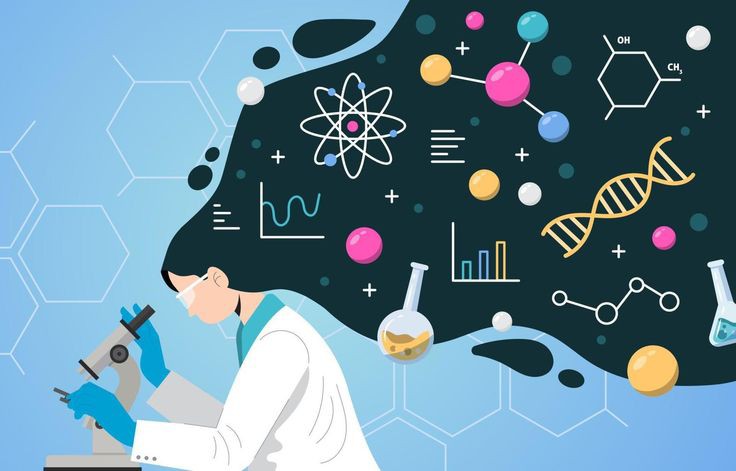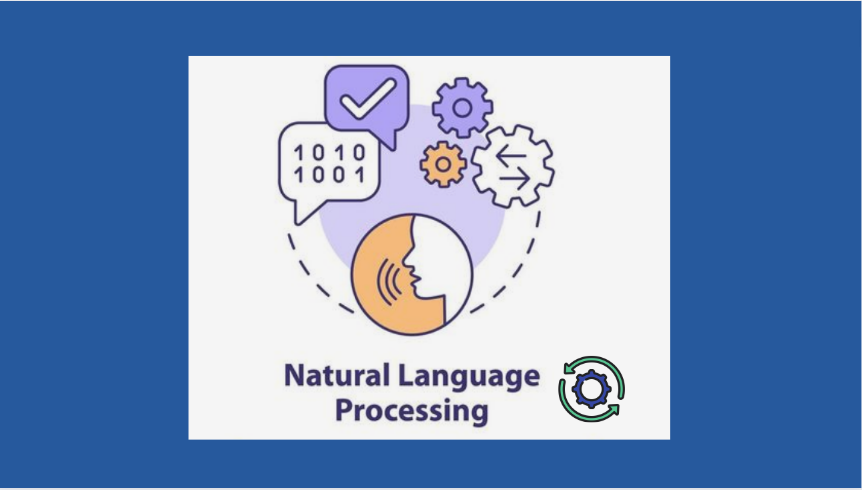- Introduction to Molecular Biology:
- Educational Requirements: Navigating the Path to Becoming a Molecular Biologist
- The Significance of Research Experience
- Artificial Intelligence and Molecular Biologist career
- Career as a Molecular Biologist
- Top Molecular Biologist In India
- Conclusion:
- Frequently Asked Questions:
Introduction to Molecular Biology:
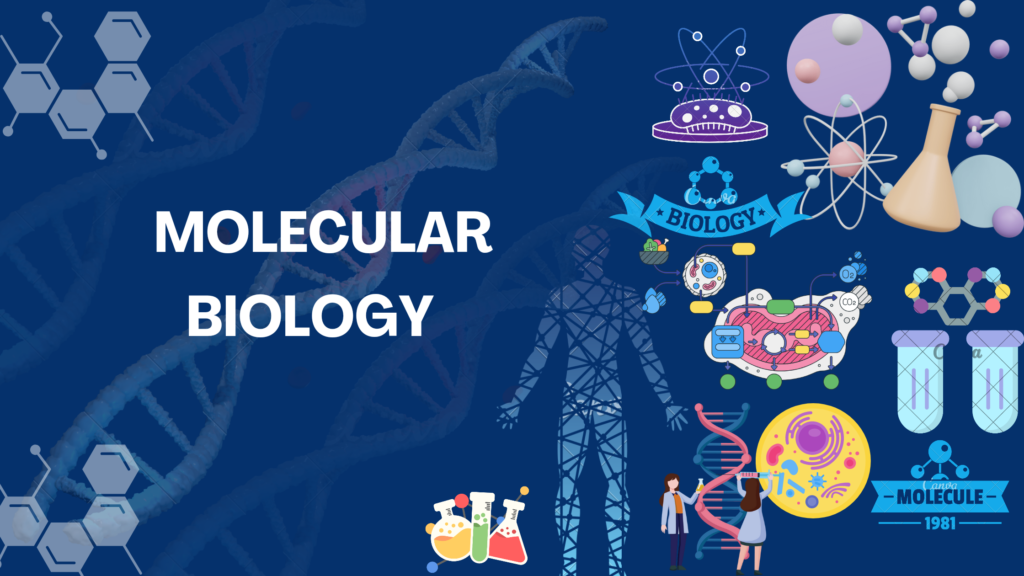
Biology often considered the cornerstone of biological science is a complex and fascinating field that delves into the fundamental processes of life at a microscopic level. It serves as a link between chemistry and biology providing insights into how living organisms work.
At its essence, molecular biology focuses on studying the building blocks of life. Those mysterious entities enable life to exist. It aims to understand the mechanisms that govern the structure, function, and regulation of biomolecules like DNA, RNA, proteins, and lipids. Through experimentation and cutting-edge technologies, molecular biologists. Decipher the intricacies in these molecules within cells, tissues, and organisms.

Educational Requirements: Navigating the Path to Becoming a Molecular Biologist
Embarking on a career as a biologist is a journey. However, it’s crucial to choose the path to reach your goals in this field successfully. In this section, we will explore the requirements. Emphasize the significance of academic milestones when pursuing a career in molecular biology.
- The Essential Foundation: Bachelor’s Degree

Your exploration into biology typically begins with obtaining a bachelor’s degree in biology or a related field closely associated with it. This foundational education provides you with an understanding of the principles of biology, such, as genetics, cellular biology, microbiology, and chemistry. It serves as the step towards comprehending the network of molecules that make up life.
- Striving for Excellence: Masters Degree
While a bachelor’s degree forms a basis many ambitious individuals in the field of biology choose to pursue a Masters’s degree to further their education. This advanced degree allows you to specialize in genetics, genomics, or structural biology. It also involves research projects and coursework that sharpen your skills.
- The Summit of Expertise: Doctoral Degree (Ph.D.)
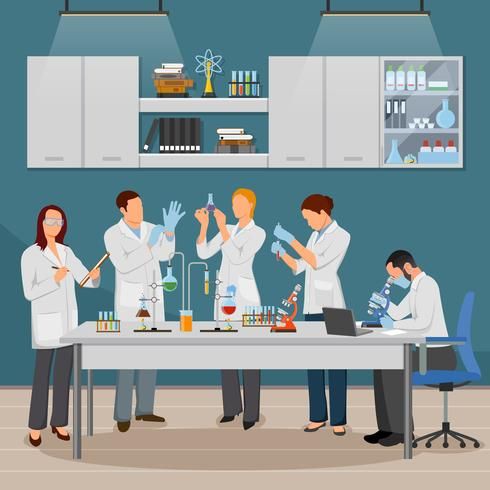
For those deeply committed to biology obtaining a Ph.D. Represents the level of academic accomplishment. Doctoral programs involve research. Often culminate in a dissertation that contributes new knowledge to the field. This level of education is crucial, for individuals aspiring to lead groundbreaking research projects teach at universities, or work in roles.
The Significance of Research Experience
Throughout your journey, it is essential to gain hands-on experience, in research. Engaging in laboratory work and research projects provides insights into biology techniques, equipment usage, and the scientific method. This experience deepens your understanding and enhances your competitiveness in the job market.
Qualities: Navigating the Intricacies of Molecular Biology
A career in biology goes beyond being a profession; it is a calling. To excel in this captivating field aspiring biologists must possess a combination of skills and qualities that enable them to unravel the mysteries of life at the molecular level. In this section, we will shed light on the attributes for success on this extraordinary scientific journey.
- A Solid Foundation in Biology and Chemistry
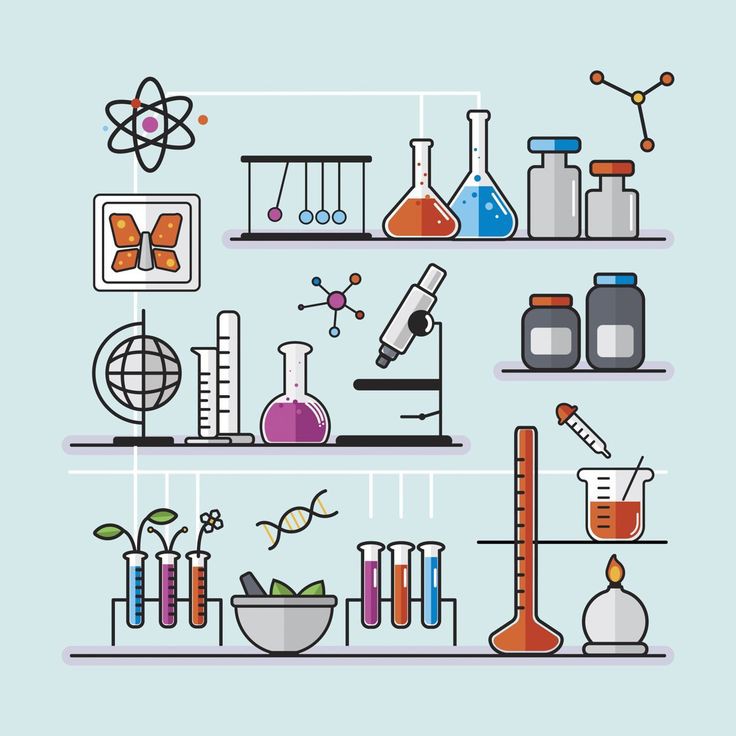
A strong grasp of biology and chemistry serves as the foundation for biology. Proficiency in these subjects plays a role in comprehending the processes that govern the world at a molecular scale. Molecular biologists dissect DNA, RNA, proteins, and other biomolecules, thus having an understanding of these disciplines is indispensable.
- Attention to Detail
Precision holds significance within the realm of molecules. Molecular biologists must diligently design experiments, meticulously record data, and carefully analyze results.Even the tiniest oversight can result in findings highlighting the importance of unwavering attention to detail.
- Thinking and Problem Solving Skills
The laboratory of a biologist is, like a playground filled with puzzles. They must carefully evaluate procedures troubleshoot any issues that arise and come up with solutions. Having the ability to think analytically and creatively is absolutely essential.
- A Passion for Research
Biology is a field fueled by curiosity and a thirst for discovery. Genuine enthusiasm for unraveling the secrets behind life’s building blocks motivates researchers to persist through obstacles and setbacks.
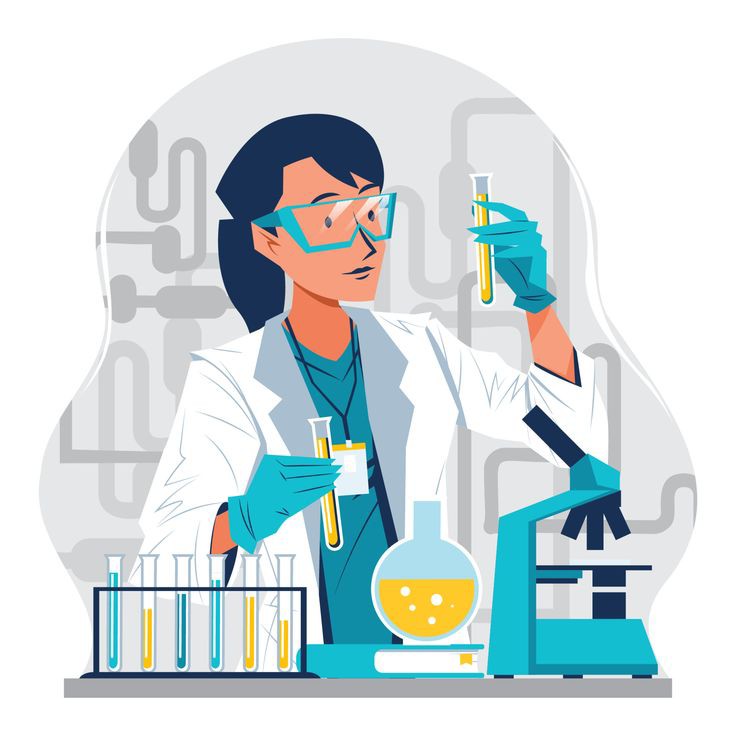
5. Communication Abilities
Effective communication plays a role in biology. Researchers must clearly convey their research findings through written reports, presentations and published works. Collaborative teamwork often serves as the foundation for progress making interpersonal skills just as valuable.
6. Technological Proficiency
Molecular biology stands at the forefront of advancement. It is crucial to possess proficiency in state-of-the-art laboratory equipment, software and techniques. Staying updated on the latest advancements is an ongoing requirement.
7. Patience and Resilience
Research, in biology can be a demanding journey. Significant breakthroughs could take years to achieve. Patience and resilience are virtues that sustain biologists through both triumphs and hardships.
8. Ethics in Molecular Biology
As scientists specializing in biology it is crucial for us to maintain the ethical standards, in our research. We must be fully aware of the implications that arise when working with and conducting studies involving human subjects.
Artificial Intelligence and Molecular Biologist career
AI (Artificial Intelligence) is having a significant impact on the field of molecular biology, offering both advantages (PROS) and challenges (CONS). Here’s a breakdown of how AI is affecting molecular biologists:
| PROS | CONS |
| Data Analysis and Interpretation: High Throughput Analysis: AI algorithms can process vast amounts of biological data generated from sequencing, imaging, and other techniques at a much faster rate than humans. This accelerates the pace of research. | Data Quality and Bias: Quality Control: AI heavily relies on the quality of data. Inaccurate or biased data can lead to erroneous results. |
| Pattern Recognition: AI can identify patterns and correlations in complex datasets, enabling researchers to make connections that may be difficult to discern manually. | Data Bias: AI algorithms can inherit biases present in the data, potentially leading to biased conclusions or recommendations. |
| Drug Discovery and Design: Virtual Screening: AI can screen millions of chemical compounds to predict their potential as drug candidates, saving time and resources. | Loss of Jobs: Automation: As AI takes over repetitive tasks, there is a concern that it may lead to a reduction in certain laboratory positions, particularly those involving routine data analysis. |
| Drug Target Identification: AI helps identify specific molecular targets for drug development by analyzing biological pathways and genetic data. | Interpretability: Black-Box Problem: Some AI models, such as deep learning neural networks, can be difficult to interpret, making it challenging for researchers to understand why a particular decision was made. |
| Personalized Medicine: Patient Profiling: AI can analyze patient data (genetic, clinical, and environmental) to tailor treatment plans and predict disease risks. | Ethical and Privacy Concerns: Data Privacy: AI requires access to large datasets, which can raise concerns about patient privacy and data security in healthcare applications. |
| Early Diagnosis: AI algorithms can detect biomarkers and genetic mutations associated with diseases, enabling early diagnosis and intervention. | Ethical Dilemmas: Decisions made by AI in areas like genetic editing and drug discovery can raise ethical dilemmas and require careful consideration. |
| Precision in Experiments: AI-controlled instruments ensure precision and accuracy in experiments, reducing human error. | Dependency on Technology: Overreliance: Overreliance on AI for decision-making can reduce critical thinking and human expertise in molecular biology. |
| Data Integration: AI can integrate data from diverse sources, such as genomics, proteomics, and clinical records, to provide a holistic view of biological processes and diseases. | Cost of Implementation: Initial Investment: Implementing AI technologies in laboratories may require a significant initial investment in infrastructure, software, and training. |
Career as a Molecular Biologist
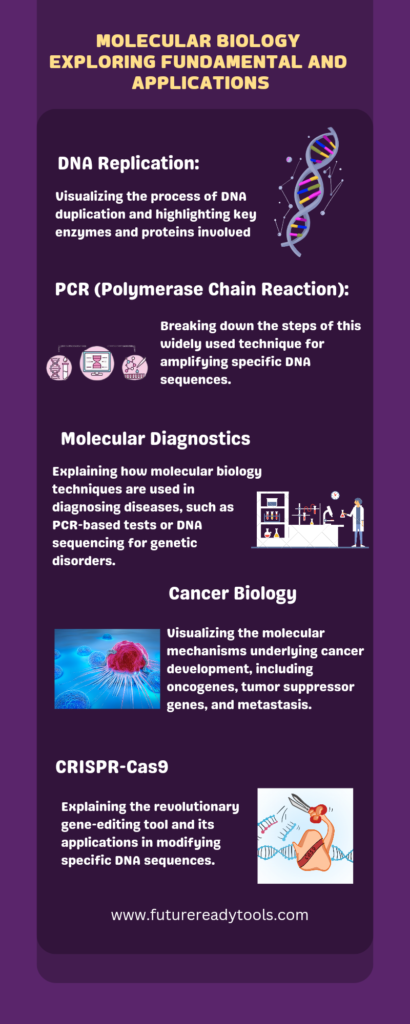
Molecular biologists possess a set of skills that offer a range of career opportunities, in various industries. Lets take a look at some examples of industries and the opportunities available for biologists:
- Pharmaceutical and Biotechnology Companies:
Drug Discovery: Molecular biologists can contribute to the identification, development, and optimization of new drugs. They play a role in target validation.
Bioprocessing: They can be involved in the production and purification of biopharmaceuticals like monoclonal antibodies and vaccines.
Quality Control: Molecular biologists ensure the molecular quality testing of pharmaceutical products ensuring their consistency. - Academic and Research Institutions:
Academic Research: Molecular biologists have the opportunity to become professors or researchers at universities or colleges leading their research projects.
Government Research: Working in government-funded research institutions allows molecular biologists to contribute to advancements and public health initiatives. - Clinical Laboratories and Healthcare:
Clinical Genetics: Molecular biologists can work in genetics labs where they perform testing to diagnose genetic disorders.
Molecular Diagnostics: They can develop and validate tests for diseases, like cancer or infectious diseases.
4. Agriculture and Food Industry
Genetically Modified Organisms: The field of agriculture and the food industry offer opportunities, for biologists. One area involves their involvement in the development and testing of modified crops aiming to improve yield and resistance against pests. Additionally, they play a role in ensuring food safety by conducting tests to detect contaminants and pathogens.
5. Environmental and Conservational Organisations:
- Environmental Monitoring: Molecular biologists can analyze environmental samples to monitor and assess pollution levels, biodiversity, and ecological health.
- Conservation Genetics: They contribute to conservation efforts by studying the genetics of endangered species and populations.
6. Forensic and Criminal Justice
In the realm of forensics and criminal justice molecular biologists utilize DNA profiling techniques for DNA analysis. This helps investigators with investigations, including identifying remains.
7. Bio Informatics and Data science
Bioinformatics and data science provide another avenue for biologists expertise. Those with skills can specialize in biology or bioinformatics. In this field they analyze datasets and develop algorithms specifically designed for genomics and proteomics research.
8. Pharmacogenomics and Personalized Medicine:
Pharmacogenomics is an emerging field where molecular biologists can make contributions to medicine. By leveraging testing methods they help tailor drug treatments based on an individual’s profile, ultimately optimizing therapeutic outcomes.
9. Biomedical Research and Academic Publishing:
Scientific Writing and Publishing: Lastly within research and publishing domains molecular biologists can pursue careers as science writers or editors for academic journals. Through these roles, they effectively communicate research findings to the community.
10. Beginnings of Startup Companies and Entrepreneurship:
Individuals, with a passion for biology and a knack for business, can establish biotechnology startups that concentrate on groundbreaking solutions in fields such as CRISPR-based gene editing, synthetic biology, or innovative diagnostics.
11. Government and Regulatory Agencies:
Regulatory bodies make use of the expertise of biologists to assess the safety and effectiveness of pharmaceuticals, biological products, and medical devices.
12. Non-Profit Organizations:
Molecular biologists have the opportunity to make contributions to profit organizations that are dedicated to public health initiatives, scientific education efforts, or advocacy, for specific diseases.
These are a few examples that highlight how molecular biologists can apply their skills across sectors contributing to various fields of study, healthcare, and scientific advancements. To learn more about career paths check out this website https://futurereadytools.com/category/careers/
External links: https://www.edx.org/learn/molecular-biology
Top Molecular Biologist In India
Here are some of the biologists, in India:
Rajeev K. Varshney is the Director of the International Crops Research Institute for the Semi-Arid Tropics (ICRISAT). He is widely recognized for his expertise in plant genomics and molecular breeding. Varshney has made significant contributions to the development of crop varieties, such as chickpea, pigeon pea, and groundnut.
Nazneen Rahman holds a position as a Professor of Cancer Genetics at Kuvempu University in Karnataka. She is highly regarded for her contributions to cancer genetics research in India. Rahman’s work has significantly advanced our understanding of the basis of cancer. Additionally, she founded the Cancer Genetics Clinic at Kidwai Memorial Institute of Oncology in Bengaluru.
Akhilesh K. Tyagi serves as a Professor of Molecular Biology at the Indian Institute of Technology (IIT) Delhi. His expertise lies specifically in plant biology. Tyagi has made contributions to the development of crops and is also credited with establishing the Plant Biotechnology Research Centre at IIT Delhi.
Hari D. Upadhyaya works as a Principal Scientist at the Indian Council of Agricultural Research (ICAR). He is highly respected within his field due to his knowledge and experience with plant genomics and molecular breeding. Upadhyayas work has been instrumental in enhancing crop varieties like chickpeas, pigeon peas, and groundnut.
Lalji Singh holds the position of Professor of Molecular Biology, at the Centre for Cellular and Molecular Biology (CCMB) in Hyderabad. He has established himself as an authority in the field of plant biology making noteworthy advancements in our comprehension of plant development and disease resistance, at the molecular level.
These individuals have made contributions to their fields demonstrating their expertise in various aspects of molecular biology and genetics research, within India.
Conclusion:
In summary, molecular biology goes beyond being a field, it offers an intriguing journey, into the very core of life itself. Its profound insights and practical applications continue to shape the future of medicine, agriculture, and biotechnology. As we navigate this captivating realm we unravel the mysteries of existence step by step forever changing our perspective on the complexities of life. Welcome to the realm of biology, where even the smallest components hold secrets.
As individuals pursuing a career in biology, your path is like a canvas waiting for your unique contributions. Each role plays a part in the picture of progress and every discovery adds to our understanding of life at its most fundamental level. Whether you choose to explore research frontiers, mentor future scientists, or Influence healthcare future direction your journey, as a molecular biologist promises excitement and fulfillment.
Frequently Asked Questions:
- Can you explain the role of a biologist?
A. A molecular biologist is a scientist who delves into the intricacies of molecules, like DNA, RNA, and proteins. They employ techniques such as cloning, sequencing, and microscopy to investigate these molecules. Molecular biologists can be found working in environments like academia, industry, or government.
2. What are the job prospects for biologists?
A. The job prospects for biologists are promising. According to the U.S. Bureau of Labor Statistics, employment opportunities in this field are projected to grow by 10% from 2020 to 2030 which is significantly faster than the growth rate across all occupations. This expansion is primarily driven by the rising demand for molecular biology research in fields like healthcare, agriculture, and environmental science.
3. What path should one pursue to become a biologist?
A. To become a biologist most individuals typically pursue a Ph.D. In disciplines such as biology, biochemistry, or related fields. However, some entry-level positions may accept candidates with a master’s degree as well. Apart from education requirements strong laboratory skills and critical thinking abilities are essential for prospective molecular biologists to excel in their field.
4. Could you outline some of the subfields, within biology?
A. Molecular biologists have opportunities, in fields, such as:
- Research; Molecular biologists in academia engage in research to deepen our understanding of the principles of molecular biology and create innovative methods and techniques.
- Industry; Molecular biologists working in the industry focus on developing products and services including drugs and vaccines.
- Government; Molecular biologists working for organizations contribute to projects, such as devising advanced approaches for disease detection and prevention.
5. What are some of the skills that molecular biologists need?
A. Skills required for biologists include:
- Strong laboratory skills: Alongside their expertise molecular biologists need to possess skills within the laboratory setting.
- Thinking and problem-solving abilities: Molecular biologists must be adept at analyzing their research and effectively resolving challenges that emerge during experimentation.
- Communication skills: It is essential for molecular biologists to convey their findings both to communities and nonscientific audiences with clarity and precision.
- Teamwork capabilities: Collaboration is integral to the work of biologists as they often collaborate within teams, on research projects.
6. How much do molecular biologists earn?
A. Salaries can vary based on factors such as the employer type, location, and level of experience.
7. What are some of the difficulties faced by biologists?
A. Molecular biology is a field that presents challenges. Molecular biologists often work hours. May frequently need to travel for their work. They also encounter the frustration of experiments that do not yield the desired results.
8. What are some of the advantages of being a biologist?
Molecular biology offers rewards for those working in this field. Molecular biologists have the opportunity to contribute significantly to advancements and enhance people’s lives through their work. They also get to engage in cutting-edge research that pushes boundaries.
9. What advice would you give to individuals in pursuing a career as a biologist?
A. If you aspire to become a biologist my recommendation is to take many science courses as possible during high school and college years. It would be beneficial to participate in research projects well since this will provide you with valuable experience and skills necessary for success in a career, within molecular biology.
10. What are some of the most exciting research areas in molecular biology today?
A. Molecular biologists are currently engaged in a range of research areas, such as:
- Cancer research; Scientists in biology are actively exploring approaches to detect and treat cancer more effectively.
- Gene editing; Researchers, in this field are focused on advancing gene editing technologies, which have the potential to cure diseases and enhance crop yields.
- Personalized medicine: Molecular biologists are dedicated to developing personalized medicine treatments that can be customized based on an individual’s makeup.

